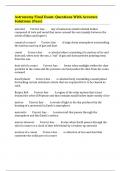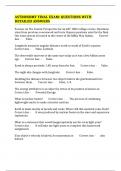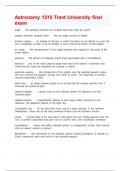Astronomy final exam - Study guides, Class notes & Summaries
Looking for the best study guides, study notes and summaries about Astronomy final exam? On this page you'll find 234 study documents about Astronomy final exam.
Page 3 out of 234 results
Sort by
Astronomy Final Exam: Questions With Accurate Solutions (Pass)
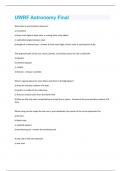
-
UWRF Astronomy Final Exam Questions and Answers 100% Solved correctly
- Exam (elaborations) • 26 pages • 2024
- Available in package deal
-
- $7.99
- + learn more
What does a spectrometer measure? a) resolution b) how much light of each color is coming from a sky object c) subtended angle between stars d) length of a sidereal year - Answer-b) how much light of each color is coming from a sky The apparent path of the sun, moon, planets, and zodiac across the sky is called the a) equator b) celestial equator c) ecliptic d) horizon - Answer-c) ecliptic What is special about the stars Mizar and Alcor in the Big Dipper? a) they are actually a system...
ASTRONOMY FINAL EXAM: QUESTIONS WITH DETAILED ANSWERS
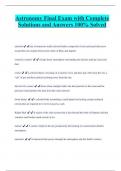
-
Astronomy Final Exam with Complete Solutions and Answers 100% Solved
- Exam (elaborations) • 11 pages • 2024
- Available in package deal
-
- $12.99
- + learn more
Astronomy Final Exam with Complete Solutions and Answers 100% Solved asteroid ️️any of numerous small celestial bodies composed of rock and metal that move around the sun (mainly between the orbits of Mars and Jupiter) coma(of a comet) ️️A large dusty atmosphere surrounding the nucleus mad up of gas and dust. comet ️️a celestial object consisting of a nucleus of ice and dust and, when near the sun, a "tail" of gas and dust particles pointing away from the sun. dust tail...
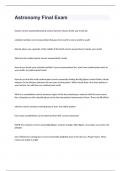
-
Astronomy Final Exam 2024 with 100% complete solutions
- Exam (elaborations) • 12 pages • 2024
-
- $15.49
- + learn more
horizon correct answerstheoretical surface flat from shores all the way to the sky celestial meridian correct answersline that goes from north to one's zenith to south directly above you, opposite of the middle of the Earth correct answershow to locate your zenith What are the cardinal points correct answersNorth, South How do you locate your celestial meridian? correct answersdraw line, start from cardinal point north to your zenith, to cardinal point South How do you find the n...
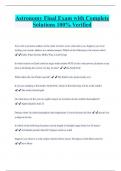
-
Astronomy Final Exam with Complete Solutions 100% Verified
- Exam (elaborations) • 9 pages • 2024
- Available in package deal
-
- $13.99
- + learn more
Astronomy Final Exam with Complete Solutions 100% Verified You write your home address in the order of street, town, state and so on. Suppose you were writing your cosmic address in a similar manner. Which of the following is the correct order? ️️Earth, Solar System, Milky Way, Local Group In what location on Earth could an eager math student NOT use her solar-power calculator at any time at all during the course of a day in June? ️️the South Pole What makes the star Polaris s...
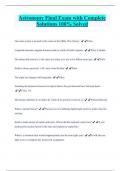
-
Astronomy Final Exam with Complete Solutions 100% Solved
- Exam (elaborations) • 8 pages • 2024
- Available in package deal
-
- $14.99
- + learn more
Astronomy Final Exam with Complete Solutions 100% Solved Our solar system is located in the center of the Milky Way Galaxy. ️️False. Longitude measures angular distance north or south of Earth's equator. ️️False, Latitude. The observable universe is the same size today as it was a few billion years ago. ️️False. Earth is always precisely 1 AU away from the Sun. ️️False. The night sky changes with longitude. ️️False. Doubling the distance between two objects halves th...
Astronomy 1510 Trent University final exam
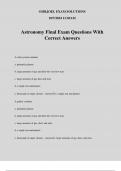
-
Astronomy Final Exam Questions With Correct Answers
- Exam (elaborations) • 57 pages • 2024
-
- $11.49
- + learn more
Astronomy Final Exam Questions With Correct Answers A solar system contains a. primarily planets b. large amounts of gas and dust but very few stars c. large amounts of gas dust and stars d. a single star and planets e. thousands of super clusters - answerd. a single star and planets A galaxy contains a. primarily planets b. large amounts of gas and dust but very few stars c. large amounts of gas, dust, and stars d. a single star and planets e. thousands of super clusters - answerc....
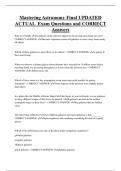
-
Mastering Astronomy Final UPDATED ACTUAL Exam Questions and CORRECT Answers
- Exam (elaborations) • 11 pages • 2024
-
- $9.99
- + learn more
Mastering Astronomy Final UPDATED ACTUAL Exam Questions and CORRECT Answers Why do virtually all the galaxies in the universe appear to be moving away from our own? - CORRECT ANSWER- Because expansion causes all galaxies to move away from nearly all others Which of these galaxies is most likely to be oldest? - CORRECT ANSWER- a galaxy in the Local Group

Study stress? For sellers on Stuvia, these are actually golden times. KA-CHING! Earn from your study resources too and start uploading now. Discover all about earning on Stuvia

